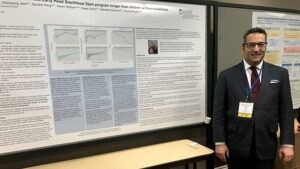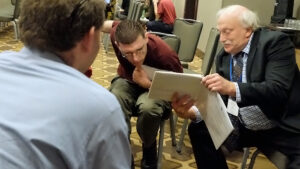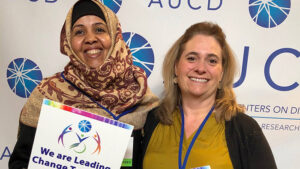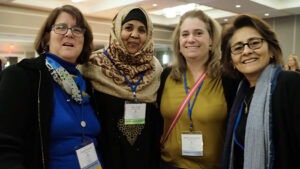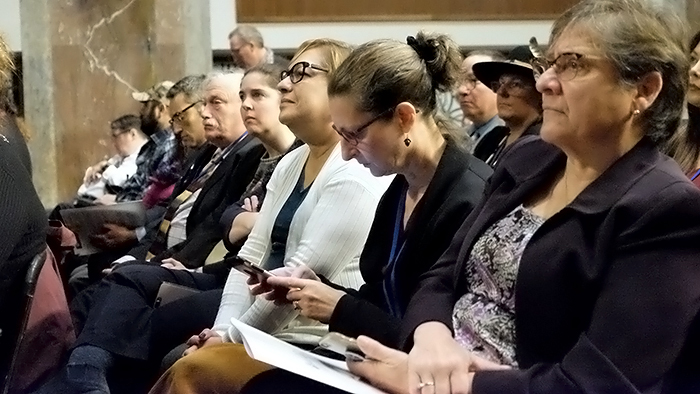
CCIDS Presents Research and Work-in-Progress at 2019 AUCD Conference
CCIDS faculty, staff and a community partner recently presented their research or reported on their work-in-progress at the November 2019 Association of University Centers on Disabilities (AUCD) Conference in Washington, DC.
(Photo above of AUCD conference closing plenary session courtesy of AUCD).
Founded in 1971, AUCD is a network of interdisciplinary centers advancing policy and practice for and with individuals with intellectual, developmental and other disabilities, their families, and communities. This year’s conference theme, Leading Change Together, reflects the work being done across the network on research, policy, practice, and advocacy that impacts the broad spectrum of disability.
Alan Cobo-Lewis, Dale Walker, Noreen Yazejian, Shinyoung Jeon, Sandra Hong, Karen Stoiber, Diane Horm, Gabriela Guerrero, and Donna Bryant partnered on a peer-reviewed poster presentation, Children with Disabilities Tend to Stay in a Highly-Resourced Early Head Start/Head Start Program Longer than Children Without Disabilities (PDF). Dr. Cobo-Lewis was the lead presenter at the conference.
Abstract: Using data from 21 Educare schools, the researchers measured the rate at which children from birth to kindergarten-age enter the school and rate at which they exit the school. Educare schools are highly resourced Early Head Start/Head Start programs targeting children at risk, especially children from low-income backgrounds. About 10% of the children have a disability. Results showed that children with a disability tended to stay in the program longer, especially when enrolled in Early Head Start.
Alan Kurtz, Ph.D. and Janet May, M.Ed. partnered on a peer-reviewed poster presentation, Collaboration with Parent-Run Organization, a Support Agency and Adults with Developmental Disabilities to Improve the Quality of Life (PDF). Dr. Kurtz was the lead presenter at the conference.
Abstract: CCIDS staff worked with a parent organization to develop a plan for evaluation of a residential alternative for their adult children that included pre-post quantitative and qualitative measures of resident quality of life and a review of planning documents. A quality of life survey was administered separately to residents and parents shortly before their move into the new residence and about one year after their move. CCIDS also provided training for agency staff, parents, and residents on authentic person-centered planning and facilitating community connections.
Marnie Morneault, M.Ed., and Hibo Omer, MPH, partnered on and co-presented a peer-reviewed poster presentation, Collaborating for Change: NH-ME LEND/New Mainer’s Public Health Initiative – An Interagency Parent Advocacy and Information Project (PDF).
Abstract: Over the past two decades, Maine has experienced rapid growth of racially, ethnically and linguistically diverse populations, as has the US generally. Although Maine’s population is largely White (95%), children in Maine are disproportionately from minority populations; currently 9% of children in Maine are from a race other than White. With funding support from a Focused Assistance to Support Training Project (FAST) grant, the NH-ME LEND Program partnered with New Mainers Public Health Initiative (NMPHI) to develop and deliver parent advocacy training modules for Somali parents of children with Autism Spectrum Disorder (ASD). NMPHI is a public health and social service agency headquartered in Lewiston that serves New Mainers—recent immigrants to the secondary resettlement area and their families.
Susan M. Russell, M.Ed., and Betsy P. Humphreys, Ph.D., partnered on a peer-reviewed poster presentation, Partnership of NH-ME LEND and New Mainers Public Health Initiative to Offer Training Experiences with Culturally and Linguistically Diverse Populations (PDF). Ms. Russell was the lead presenter at the conference.
Abstract: Over the past two decades, the geographic area served by the NH-ME LEND Program has experienced rapid growth of racially, ethnically and linguistically diverse populations, as has the U.S. in general. While the NH-ME LEND clinical and leadership placements provide opportunities for frequent contact with underserved populations, Maine trainees, in particular, have had few opportunities for training or fieldwork with culturally and linguistically diverse populations. With funding support from a 2018 Focused Assistance to Support Training Project (FAST) grant, the NH-ME LEND partnered with New Mainers Public Health Initiative (NMPHI) in Lewiston, Maine, to build the LEND’s capacity to offer inclusive and culturally and linguistically competent training experiences in response to an identified area of need. Lewiston is the second largest city in the state and a secondary resettlement area for refugees from Somalia.
Photo credits:
Photo of Dr. Alan Cobo-Lewis at his poster courtesy of Cynthia Thielen.
All other photos courtesy of the Association of University Centers on Disabilities.


